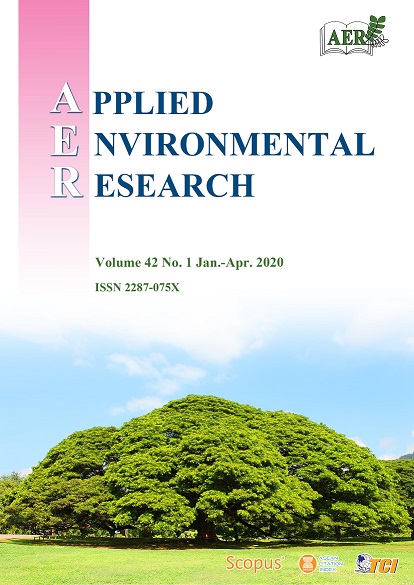Assessment of Organophosphate and Carbamate Insecticides and Heavy Metal Contamination in Canal-Grown Water Morning Glory (Ipomoea aquatica Forssk) in Nakhon Nayok Province, Thailand
Main Article Content
Abstract
Excessive application of insecticides in agriculture has become an increasing trend in Thailand, where agriculture is common in the area. This problem leads to negative impacts on human health and environment. Therefore, this study focused on monitoring organophosphate and carbamate insecticides, and heavy metals (Cd, Cu, Pb, Ni, Hg, Zn and Mn) in Ipomoea aquatica Forssk, as well as water and soil from different canals in Ongkharak District, Nakhon Nayok Province, Thailand. The powder samples were prepared from roots, stems and leaves of Ipomoea aquatica Forssk, as well as soil. Then, anti-acetylcholinesterase activity of each sample was determined, and heavy metal contents were measured by atomic absorption spectrometry. The results showed that the highest anti-acetylcholinesterase activity was found in the soil samples, followed by those of leaves and stems, roots, and water, respectively. Additionally, the order of heavy metal concentration of stem and leaves, root, water and soil samples were Mn>Cu>Hg>Ni>Zn>Cd>Pb, Mn>Zn>Ni >Cu>Cd>Hg>Pb, Ni>Cu>Hg>Mn>Cd>Zn>Pb, and Mn>Cu>Ni>Zn>Pb>Cd>Hg, respectively. The concentration of Cu and Hg in stems and leaves were above the standard levels of Ministry of Public Health (2003), while Cu and Cd in root samples were above the standard levels. Additionally, the concentrations of Cd, Ni and Zn in all water samples were above the standard levels of Ministry of Natural Resources and Environment (1994), and the concentrations of Cu, Hg and Mn in certain water samples were above the standard levels. The translocation factors (TFroot and TFwater) and bioaccumulation factor (BAF) above 1 were observed in order of Cu>Ni>Cd>Zn>Mn, Mn>Zn>Ni >Cd, and Mn>Zn>Ni>Cd, respectively. The findings provide useful information to agricultural and public health authorities for a dialogue in policy development (i.e. the importation and use of pesticides) to minimize health risk of vulnerable population including farmers and nearby communities in the province, and thus strengthening equity in health.
Article Details

This work is licensed under a Creative Commons Attribution-NonCommercial 4.0 International License.
Published articles are under the copyright of the Applied Environmental Research effective when the article is accepted for publication thus granting Applied Environmental Research all rights for the work so that both parties may be protected from the consequences of unauthorized use. Partially or totally publication of an article elsewhere is possible only after the consent from the editors.

